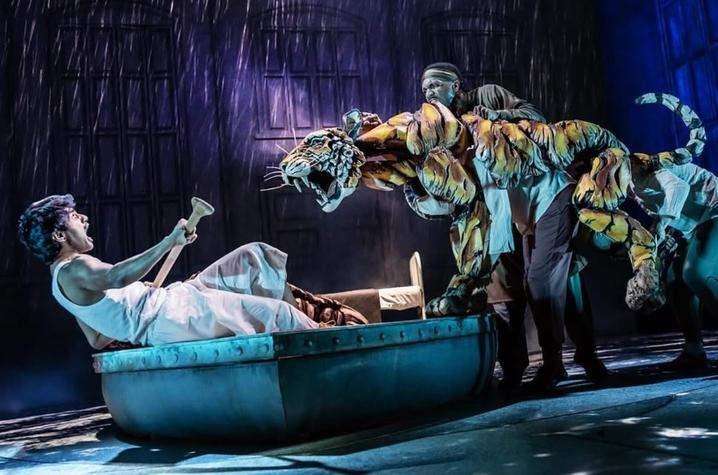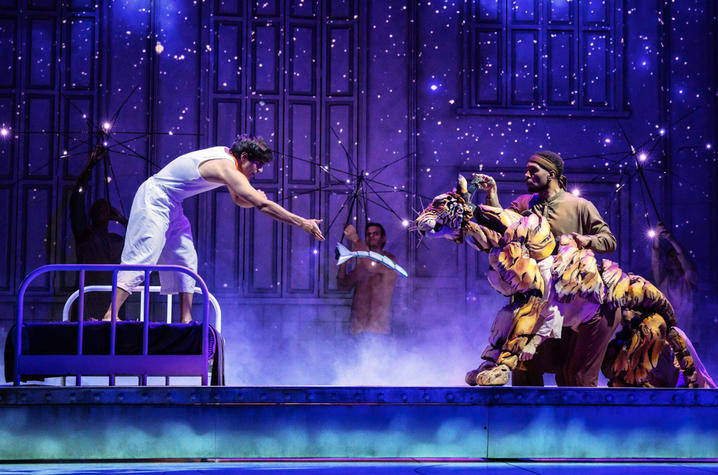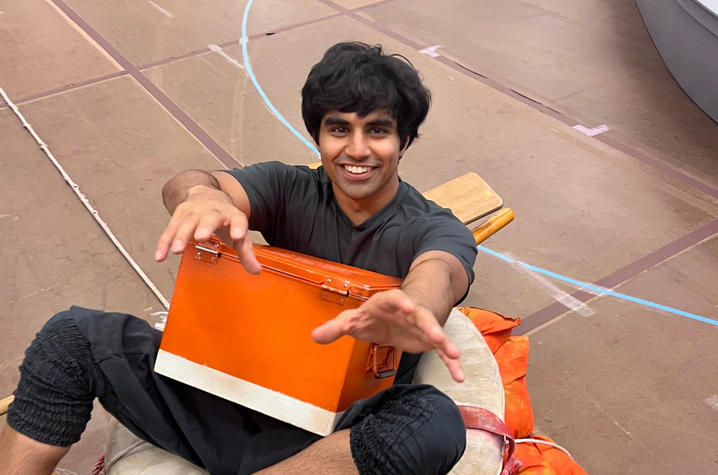UK Theatre and Dance alum living the ‘Life of Pi’
LEXINGTON, Ky. (Feb. 4, 2025) — Taha Mandviwala has immersed himself in professional theater since graduating from the University of Kentucky in 2016. His latest role is Pi Patel, the title character in the three-time Tony Award-winning Broadway play “Life of Pi.” In the Broadway production, Mandviwala played supporting roles, but he was cast as Pi for the play’s North American tour.
In the play the audience meets Pi when he is around 17 years old. He grew up in a zoo in Pondicherry, India, but to escape political persecution, he and his family board a ship bound for Canada, bringing the zoo animals with them. During the ocean crossing a storm endangers the ship, and it sinks. Pi manages to board a lifeboat, which he shares with an orangutan, a zebra, a hyena and a fully grown Bengal tiger named Richard Parker.
Mandviwala had a conversation with UKNow from his hotel room in Pittsburgh, right before the tour brought him to Cincinnati’s Aronoff Center from Feb. 4-9. He discussed the lessons he’s learned as a working actor and the foundation he received in the UK Department of Theatre and Dance.
UKNow: What are some of the less obvious differences that you’ve picked up between performing on Broadway versus being on tour? And was there anything that’s taken you by surprise?
Mandviwala: Tour life in general requires a different set of adaptability and skills to just maintain yourself. Like I think when you when you have a set show and a set commute, like just to and from the theater, that informs a very particular schedule, but when that schedule is very malleable, depending on what city you’re in, what amenities you have access to, what food you have around you like, even those little differences affect you and in subtle ways, or your energy levels are kind of all over the place sometimes.
UKNow: Are there any challenges you’d like to take on as your career continues forward?
Mandviwala: It’s so hard to say…to project yourself so far into the future because something I’ve always struggled with is remaining present — what I’m doing now — and I think as actors, it’s often easy to get in the trap of “What’s the next thing?” But I think there there’s a practical side of myself that is always steeped in that and thinking about that.
I’d love to play Hamlet one day. You know, there are a couple of Shakespeare roles that I’d be very interested in taking a swing at. I think I’m just fascinated by these kind of roles — ones that are just so demanding and mind body spirit.
But even independent of theatre, I’d love to explore things like motion capture, voice-over, to further diversify my own portfolio of work and body of work outside of theatre.
UKNow: In a previous UKNow story from 2023, you gave advice to students interested in pursuing a theatrical career. Is there anything you want to add or revise to that advice?
Mandviwala: Just be open to learning. You know, put your ego aside and learn from people that are better than you are.
I think that’s something that I’ve really come to. Denzel Washington said the first year or the first part of your life you learn. The second part of your life you earn. The third part of your life you return. And by “return,” he means giving back as a mentor.
It’s so easy to get entitled or defensive, and (let it) stop you from learning something really, really important about yourself, about the nature of the business, about the nature of artistry, about expanding beyond what you think.
So, just keep remaining open to new ideas, keep remaining curious. I think that’s my biggest piece of advice.
UKNow: Do you think back to what you’ve what you learned at UK and do any of those lessons come to the forefront of your mind as you hone your craft as a working actor?
Mandviwala: Two sides that have really stuck with me in terms of the foundations were for movement and for text. And so for movements, I owe so much to “A-Ray” — Andrew Dylan Ray. He’s still one of my, like dearest friends and mentors. Stage combat was my first introduction to theatre. The reason I got my first show which was Zombie Town, a documentary play which involved fighting a lot of zombies. A lot of that came down to stage combat prowess, and that translation happened really well, because A-Ray taught me how to nurture my current physical vocabulary into stage combat vocabulary. And how you tell a story using your body.
And then Dr. Christina Ritter and Peter Stone were my directions into text analysis and scene analysis, and the love of the craft itself — the love of how you really break down a story and character and all of the foundational acting work.
And if UK was the skeleton, then the muscles and the connective tissue and everything else that started to grow from there was from just doing the thing like acting and practicing.
There is a reality that you know the environment of a university is very different from the environment of the real world. You know, the infrastructure of college: walkability, having your peers around you and your friends around you all the time, being in a really small pond, knowing that you’re in the same sort of rotation of things. That changes very quickly and suddenly when you leave college and you’re out there and there’s a great dispersal where everybody — your friends — are suddenly not with you anymore, and your competition for roles is much more prevalent, and you have to make ends meet as well and you have like all of these other responsibilities that you have to keep up.
It’s a sobering realization, but also one that, if you build a good foundation for honing your craft, for learning, for staying open, staying curious about where you are and being objective about where you are — being the eternal learner — it’ll set you up for a much better mindset about not expecting too much too quickly, and being measured in your own progress and your own craft and your own growth.
To purchase tickets for the Cincinnati performances of “Life of Pi,” visit cincinnati.broadway.com.
Learn more about Mandviwala on his personal website, tahamandviwala.com, and on Instagram, @manlykoala.
As the state’s flagship, land-grant institution, the University of Kentucky exists to advance the Commonwealth. We do that by preparing the next generation of leaders — placing students at the heart of everything we do — and transforming the lives of Kentuckians through education, research and creative work, service and health care. We pride ourselves on being a catalyst for breakthroughs and a force for healing, a place where ingenuity unfolds. It's all made possible by our people — visionaries, disruptors and pioneers — who make up 200 academic programs, a $476.5 million research and development enterprise and a world-class medical center, all on one campus.







